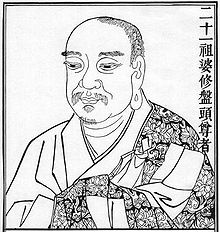Vasubandhu
| Vasubandhu | |
|---|---|

|
|
| Occupation | Buddhist monk |
| Known for | Cofounder of the Yogacara philosophical school. |
Vasubandhu (Sanskrit; traditional Chinese: 世親; ; pinyin: Shìqīn; Wylie: dbyig gnyen) (fl. 4th to 5th century C.E.) was a very influential Buddhist monk and scholar from Gandhara. Vasubandhu was a philosopher who wrote on the Abhidharma from the perspectives of the Sarvastivada and Sautrāntika schools. Along with his half-brother Asanga, he was also one of the main founders of the Yogacara school after his conversion to Mahayana Buddhism.
Vasubandhu's Commentary on the Treasury of the Abhidharma (Abhidharmakośabhāṣya) is widely used in Tibetan and East Asian Buddhism as the major source for non-Mahayana Abhidharma philosophy. His philosophical verse works set forth the standard for the Indian Yogacara metaphysics of "appearance only" (vijñapti-mātra), which has been described as a form of "epistemological idealism", phenomenology and close to Kant's Transcendental Idealism. Apart from this, he wrote several commentaries, works on logic, argumentation and devotional poetry.
Vasubandhu is one of the most influential thinkers in the Indian Buddhist philosophical tradition. In Jōdo Shinshū, he is considered the Second Patriarch and in Chan Buddhism, he is the 21st Patriarch.
Born a Brahmin in Peshawar (present-day Pakistan), Vasubandhu was the half brother of Asanga, another key personage in the founding of the Yogacara philosophy. Vasubandhu's name means "the Kinsman of Abundance." He and Asanga are members of the "Six Ornaments" or six great commentators on the Buddha’s teachings. He was contemporaneous with Chandragupta I, father of Samudragupta. This information temporally places this Vasubandhu in the 4th century CE. The earliest biography of Vasubandhu was translated into Chinese by Paramärtha (499-569). Vasubandhu initially studied with the Buddhist Sarvastivada (also called Vaibhāṣika, who upheld the Mahavibhasa) school which was dominant in Gandhara, and then later moved to Kashmir to study with the heads of the orthodox Sarvastivada branch there. After returning home he lectured on Abhidharma and composed the Abhidharmakośakārikā (Verses on the Treasury of the Abhidharma), a verse distillation of Sarvastivada Abhidharma teachings, which was an analysis of all factors of experience into its constituent dharmas (phenomenal events). However Vasubandhu had also begun to question Sarvastivada orthodoxy for some time, and had studied with the Sautantrika teacher Manoratha. Due to this, he then went on to publish an auto-commentary to his own verses, criticizing the Sarvastivada system from a Sautrāntika viewpoint (also called Dārṣtāntika).
...
Wikipedia
